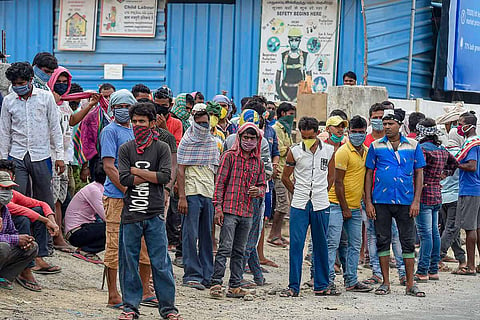

The blue tarpaulin and tin-roofed sheds in which Tahir Ali lives in Mahadevapura, a suburb in Whitefield in Bengaluru, are hidden from view if you drive past the main road. Luxury apartment blocks tower over the settlement where migrant workers from Bihar, Uttar Pradesh and Jharkhand reside.
On Wednesday, Tahir, 22, and a group of six workers from the settlement turned up at the Mahadevapura Police Station, clutching application forms and photocopies of their Aadhaar in their hands. “We were told to bring the application forms and give it to the police wala,” says Tahir.
He is unaware that the Karnataka government decided to cancel trains meant for inter-state travel of migrant workers on Tuesday. “We have not been told anything about trains being cancelled. We were told we will get a call when the train is ready to take us,” adds Tahir.
A migrant worker at the Mahadevapura police station in Bengaluru
He is not alone. Like him, thousands of migrant workers in Bengaluru hoping to return to their homes are unaware that the trains were cancelled on Tuesday. The service was stopped after Karnataka Chief Minister BS Yediyurappa held a meeting with builders who demanded that workers be made to stay back, or the ‘economy would collapse’.
By then, the Indian Railways had operated eight trains from Bengaluru with 1200 passengers in each train to transport workers to three states - Bihar, Jharkhand and Odisha.
In another part of Whitefield, migrant workers who turned up at the Varthur Police Station hoping to return to their homes were dispersed by the police. Visuals show police aggressively dispersing the people gathered using lathis.
However, police officials attempted to play down the incident. “There were around 20 migrant workers who came to the police station asking when trains will be arranged for them. We told them to register in the Seva Sindhu portal and tried to disperse them, and asked them to remain at their site. But at this point, someone argued with the police and we tried to make them leave,” says Praveen Babu, inspector of Varthur Police Station.
It is not just the workers who are unaware of the state government’s decision. Police inspectors in Bengaluru’s Whitefield division too were unaware of the cancellation of trains for inter-state travel of migrant workers.
“We have estimated that there are over 20,000 migrant workers who intend to return home. Most of the workers are from four states - Bihar, Uttar Pradesh, Jharkhand and West Bengal. Whenever they want an update on the arrangement for trains, they turn up at police stations but there is no clarity on when arrangements will be made for them,” an official involved in arranging transport for migrant workers told TNM.
Migrant workers in Mahadevapura, Bengaluru
Officials estimated around 10,000 workers from Bihar and around 4,000 workers each from Uttar Pradesh and Jharkhand, living in Whitefield, are among those who wish to return home. Contrary to earlier reports, the official says that only around 25% of migrant workers are from the construction sector. Most workers are security guards or those who work in hotels, paying guest accommodations and malls. These workers are now camped in settlements arranged by their company or the state government.
This reporter visited multiple settlements; in most places, living conditions were cramped and unhygienic.
In settlements of workers involved in the construction of the Bengaluru metro construction, over 200 people lived in a three-storey building. Others slept on bunk beds cramped into rooms with 20 or more people. “We have lived here without work for more than 40 days. Now, we simply wish to go home and be with our families,” says Gadadhar Behera, a security guard from Orissa.
Living conditions at a migrant workers' settlement near Kudlu Gate, Bengaluru
Gadadhar’s words are echoed by scores of migrant workers in his settlement, and the workers’ sentiment is painfully obvious to officials. “In almost all cases, the workers are the sole breadwinners of their families and they have the moral responsibility of going back and spending time with them. The psychosis has set in that even if they die, they want to be at home,” says an official who was involved in surveying migrant workers in the Whitefield division who wished to remain anonymous.
According to the same official, the government’s decision to suspend the train service does not take into account the wishes of thousands of migrant workers who simply wish to return home.
Settlement of migrant workers in Mahadevapura, Bengaluru
Bharatiya Janata Party (BJP) leaders have hailed the move to stop inter-state trains citing that it will help restart economic activities in the city.
Stoppage of inter-state trains by Sri @BSYBJP is a bold and necessary move.
— Tejasvi Surya (@Tejasvi_Surya) May 6, 2020
It will help migrant labourers who came here with hopes of a better life to restart their dreams. Also, it will kickstart economic activities full throttle.
Karnataka will emerge out of this stronger!
However, over 500 individuals and organisations wrote to Karnataka Chief Minister BS Yediyurappa condemning the state government’s decision and calling for it to be revoked. In the letter, it was stated that the cancellation of trains violates the workers’ right to movement and infringes their basic freedom, while also subjecting the workers to forced labour.
“We demand recognition of the autonomy and dignity of the migrant worker to decide their travel plans. No one should be forced either to stay back or to return to their home states. We demand that the Karnataka government abide by the Constitutional framework and immediately make the necessary arrangements to ensure that any worker wishing to return is allowed to do so at no cost, and in a safe and dignified manner,” read the letter.
“Even if work resumes, people here are unwilling to go to work. We wish to return home and be with our families,” says Tahir.